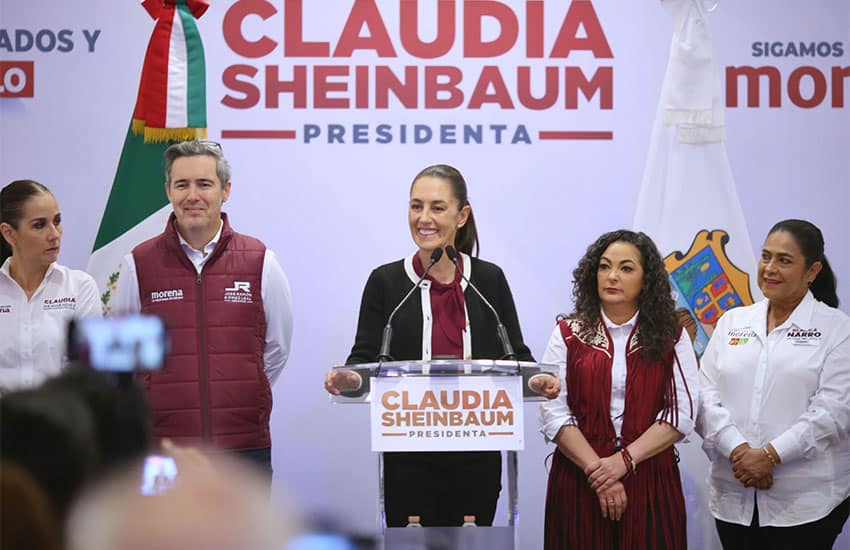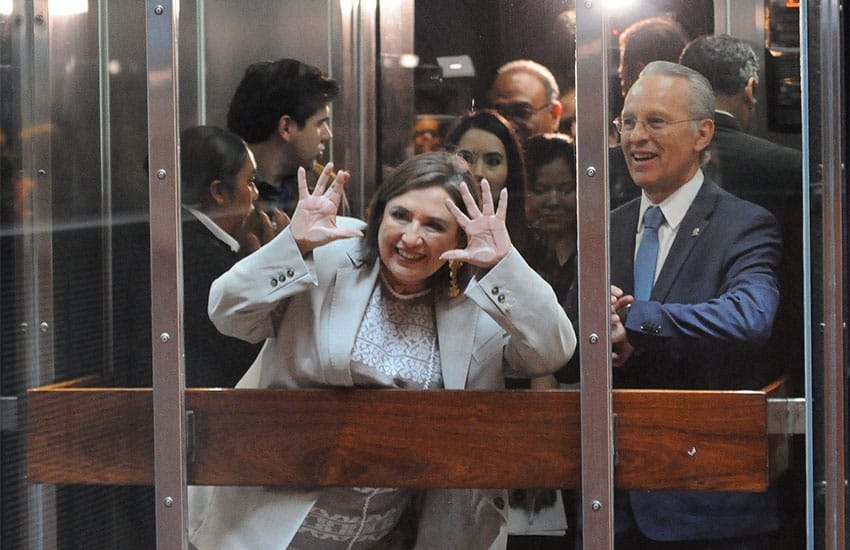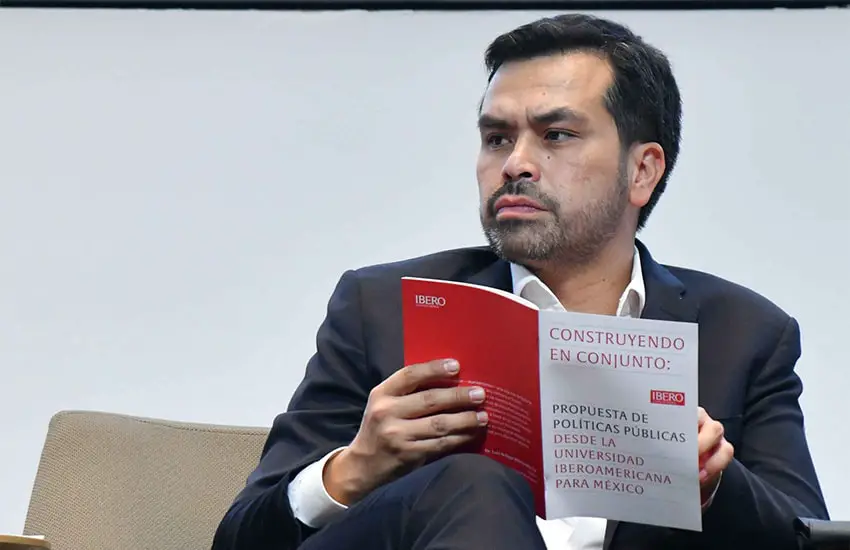It’s 75 days before Election Day, and Claudia Sheinbaum has a commanding lead over Xóchitl Gálvez in the race to become Mexico’s next president, a recent opinion poll has found.
Sheinbaum, the candidate for the ruling Morena party and its allies, has 58% support among respondents to a poll by the Reforma media group earlier this month. That gives her a 24-point lead over Gálvez, who attracted 34% support.
#ENCUESTA | Claudia Sheinbaum lideraba con 24 puntos de ventaja rumbo a la elección presidencial del 2 de junio de 2024, cuatro puntos más que en los que tenía en diciembre de 2023, así lo indicó una encuesta del diario Reforma publicada este marteshttps://t.co/lHeRcRvsm9
— Noroeste (@noroestemx) March 19, 2024
The Reforma poll shows Morena party candidate Claudia Sheinbaum with a hefty lead over opposition candidate Xóchitl Gálvez of the Strength and Heart for Mexico coalition.
Gálvez, a former federal senator, will represent a three-party opposition alliance made up of the National Action Party (PAN), the Institutional Revolutionary Party (PRI) and the Democratic Revolution Party (PRD), called Strength and Heart for Mexico.
The third candidate in the presidential contest, Jorge Álvarez Máynez of the Citizens Movement (MC) party, has just 8% support, according to the Reforma poll.
The poll surveyed 1,000 eligible voters across Mexico between March 6 and 12.
The support levels for the three candidates were calculated without considering the 17% of respondents who didn’t express a preference for any of the three candidates. Reforma said its poll has a margin of error of plus or minus 4.3%.
In addition to electing a new president, voters will renew both houses of federal Congress on June 2. Thousands of other state and municipal positions will be up for grabs in what will be Mexico’s largest elections ever.
The gap between Sheinbaum and Gálvez narrows, albeit by the smallest of margins
Reforma last conducted a national poll to gauge opinions on the upcoming presidential election in December.

Sheinbaum, Mexico City mayor from 2018 to 2023, saw 54% support in the December poll, 25 points ahead of Gálvez, who had 29%. This new poll shows that the gap between the two leading candidates has decreased by one point over three months.
Support for both Sheinbaum and Gálvez increased between December and March — four points in the case of the former and five in the case of the latter.
Álvarez Máyenz wasn’t included in the December poll since at the time, Nuevo León Governor Samuel García was expected to be the MC candidate. García, who ended his quest to become president later that month, had 17% support in that poll, more than double the 8% support Álvarez Máynez attracted this month.
Morena and allies on track to win majority in lower house of Congress
Reforma also asked in its most recent poll which party respondents plan to vote for in the federal Chamber of Deputies election. In total, the Morena-PVEM-PT alliance attracted 56% support among Reforma poll respondents:
- 46% said they would support Morena candidates.
- 6% planned to vote for Ecological Green Party of Mexico (PVEM) aspirants.
- 4% opted for hopefuls on a Labor Party (PT) ticket.
Regarding opposition parties, the PAN and PRI each attracted 15% support while 4% of respondents said they planned to vote for PRD candidates in that lower house election, for a combined support of 34% for the PAN-PRI-PRD alliance. The Citizens Movement party attracted 8% support while 2% of respondents said they would vote for independent lower house candidates.
In total, voters will elect 500 lawmakers to the lower house, while 128 Senate seats (the upper house) are also up for grabs.
At stake in this election are a suite of controversial constitutional reform proposals that President Andrés Manuel López Obrador sent to Congress in February. Sheinbaum has expressed support for them, but they are unpopular with the opposition and unlikely to be approved in the near future as Morena and its allies currently don’t have a supermajority in either the lower or upper house of Congress.
Ordinary legislation can be passed with the support of a simple congressional majority, but proposals to change the constitution are only approved if they have the backing of two-thirds of lawmakers.
Deputies and senators elected on June 2 will assume their positions on Sept. 1, one month before the current president’s six-year term ends.

A foregone conclusion?
Asked who they think will win the presidential election, 65% of respondents said Sheinbaum. Only 15% predicted a Gálvez victory while 18% of those polled said they didn’t know who would prevail.
In response to another question, about one-third of respondents said that Gálvez “could still win” while almost half said that the result is “already very well-defined in favor of” Sheinbaum. The remaining respondents said they didn’t know who would win.
Is riding on AMLO’s coattails a recipe for success?
Four in 10 respondents said Sheinbaum should support López Obrador’s reform proposals, while 51% said she should distance herself from the president and present her own political agenda.

The Morena candidate is a close ally of the president and is selling voters a Sheinbaum presidency to continue the so-called “fourth transformation,” or 4T, that López Obrador began with his 2018 election.
The 4T has been characterized by significant spending on welfare and employment programs, austerity in many other areas, a stated commitment to combating corruption and impunity, and the construction of several large infrastructure projects — including the Maya Train and the Felipe Ángeles International Aiport.
Sheinbaum is seeking to capitalize on the enduring popularity of her political mentor, who has maintained high approval ratings throughout his presidency. Of those polled by Reforma, 73% said they approved of the president’s performance, up from 62% in December.
What electoral strategy should Gálvez adopt?
Almost 80% of respondents said that the PAN-PRI-PRD candidate should focus on presenting her own proposals for Mexico as she sells herself to voters. Just 7% advised Gálvez to concentrate on questioning and criticizing López Obrador.
Five percent said that Gálvez should focus on questioning and criticizing Sheinbaum.
A slim 51% majority predicted that the three presidential candidates’ campaigns will focus on attacks on rivals, while 41% anticipated a greater emphasis on presenting proposals to benefit the country.
The candidates will have an opportunity to put forward their visions for Mexico — and attack each other face-to-face — at three presidential debates, the first of which takes place April 7.
With reports from Reforma
